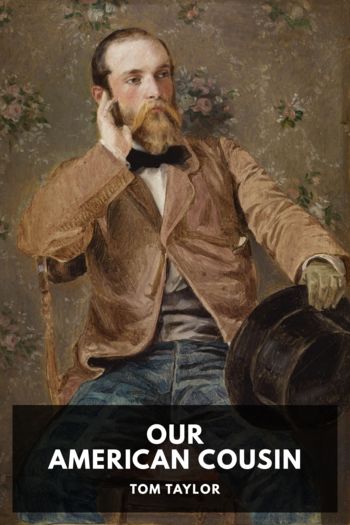Struggles and Triumphs, P. T. Barnum [good books to read in english .txt] 📗

- Author: P. T. Barnum
Book online «Struggles and Triumphs, P. T. Barnum [good books to read in english .txt] 📗». Author P. T. Barnum
A criminal prosecution was brought against me for stating in my paper that a man in Bethel, prominent in the church, had “been guilty of taking usury of an orphan boy,” and for severely commenting on the fact in my editorial columns. When the case came to trial the truth of my statement was substantially proved by several witnesses and even by the prosecuting party. But “the greater the truth, the greater the libel,” and then I had used the term “usury,” instead of extortion, or note-shaving, or some other expression which might have softened the verdict. The result was that I was sentenced to pay a fine of one hundred dollars and to be imprisoned in the common jail for sixty days.
The most comfortable provision was made for me in Danbury jail. My room was papered and carpeted; I lived well; I was overwhelmed with the constant visits of my friends; I edited my paper as usual and received large accessions to my subscription list; and at the end of my sixty days’ term the event was celebrated by a large concourse of people from the surrounding country. The court room in which I was convicted was the scene of the celebration. An ode, written for the occasion, was sung; an eloquent oration on the freedom of the press was delivered; and several hundred gentlemen afterwards partook of a sumptuous dinner followed by appropriate toasts and speeches. Then came the triumphant part of the ceremonial, which was reported in my paper of December 12, 1832, as follows:
“P. T. Barnum and the band of music took their seats in a coach drawn by six horses, which had been prepared for the occasion. The coach was preceded by forty horsemen, and a marshal, bearing the national standard. Immediately in the rear of the coach was the carriage of the Orator and the President of the day, followed by the Committee of Arrangements and sixty carriages of citizens, which joined in escorting the editor to his home in Bethel.
“When the procession commenced its march amidst the roar of cannon, three cheers were given by several hundred citizens who did not join in the procession. The band of music continued to play a variety of national airs until their arrival in Bethel, (a distance of three miles,) when they struck up the beautiful and appropriate tune of ‘Home, Sweet Home!’ After giving three hearty cheers, the procession returned to Danbury. The utmost harmony and unanimity of feeling prevailed throughout the day, and we are happy to add that no accident occurred to mar the festivities of the occasion.”
My editorial career was one of continual contest. I however published the 160th number of The Herald of Freedom in Danbury, November 5, 1834, after which my brother-in-law, John W. Amerman, issued the paper for me at Norwalk till the following year, when the Herald was sold to Mr. George Taylor.
Meanwhile, I had taken Horace Fairchild into partnership in my mercantile business, in 1831, and I had sold out to him and to a Mr. Toucey, in 1833, they forming a partnership under the firm of Fairchild & Co. So far as I was concerned my store was not a success. Ordinary trade was too slow for me. I bought largely and in order to sell I was compelled to give extensive credits. Hence I had an accumulation of bad debts; and my old ledger presents a long series of accounts balanced by “death,” by “running away,” by “failing,” and by other similarly remunerative returns. I had expended money as freely as I had gained it, for I had already learned that I could make money rapidly and in large sums, when I set about it with a will, and hence I did not realize the worth of what I seemed to gain so readily. I looked forward to a future of saving when I should see the need of accumulation.
There was nothing more for me to do in Bethel; and in the winter of 1834–5, I removed my family to New York, where I hired a house in Hudson Street. I had no pecuniary resources, excepting such as might be derived from debts left for collection with my agent at Bethel, and I went to the metropolis literally to seek my fortune. I hoped to secure a situation in some mercantile house, not at a fixed salary, but so as to derive such portion of the profits as might be due to my individual tact, energy, and perseverance in the interests of the business. But I could find no such position; my resources began to fail; my family were in ill health; I must do something for a living; and so I acted as “drummer” to several concerns which allowed me a small commission on sales to customers of my introduction.
Every morning I used to look at the “wants” in the Sun for something that would suit me; and I had many a wildgoose chase in following up those “wants.” In some instances success depended upon my advancing from three hundred to five hundred dollars; in other cases a new patent life-pill, or a self-acting mouse trap was to make my fortune. An advertisement announcing “An immense speculation on a small capital! $10,000 easily made in one year!” turned out to be an offer of Professor Somebody at Scudder’s American Museum to sell a hydro-oxygen microscope, offered to me at two thousand dollars—one thousand in cash and the balance in sixty





Comments (0)